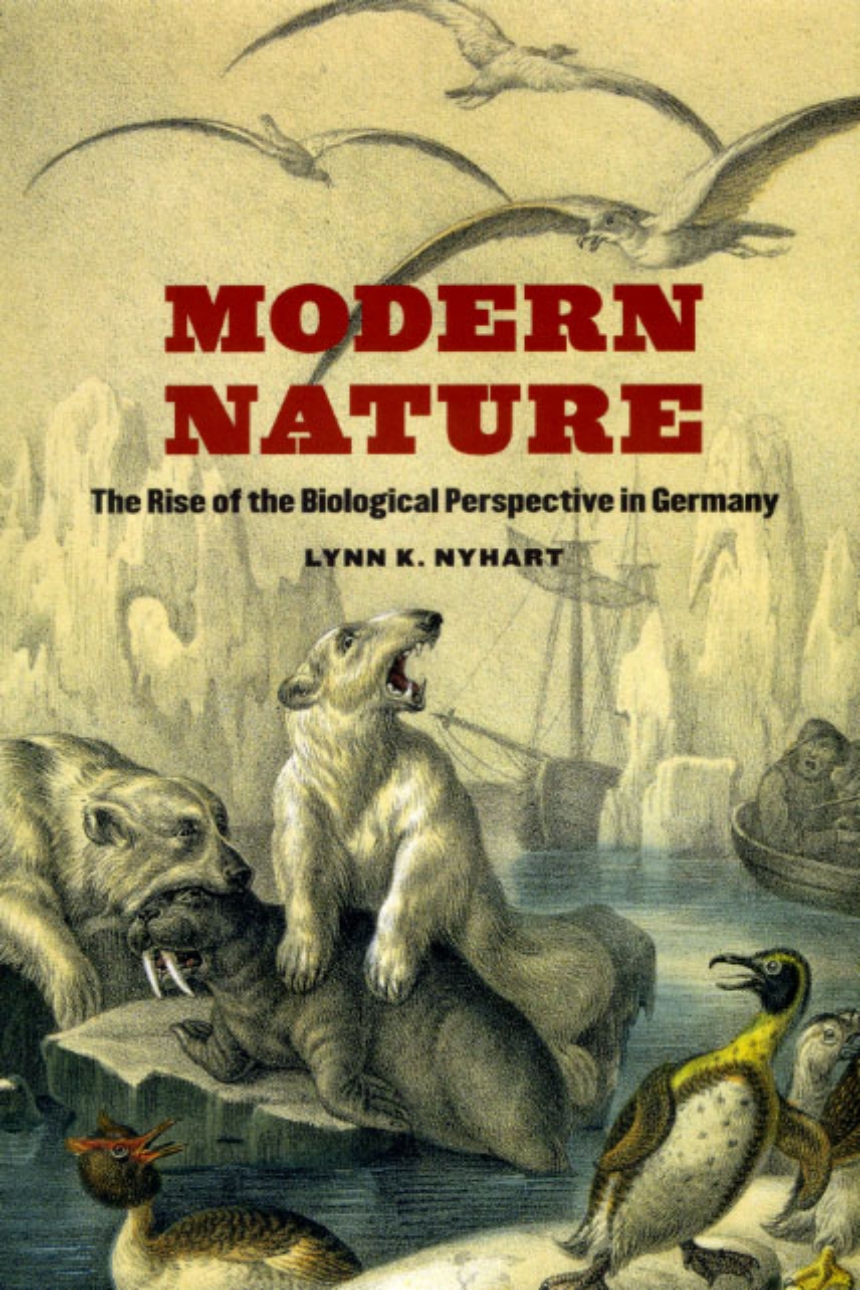Modern Nature
The Rise of the Biological Perspective in Germany
Publication supported by the Susan Elizabeth Abrams Fund in History of Science
In Modern Nature,Lynn K. Nyhart traces the emergence of a “biological perspective” in late nineteenth-century Germany that emphasized the dynamic relationships among organisms, and between organisms and their environment. Examining this approach to nature in light of Germany’s fraught urbanization and industrialization, as well the opportunities presented by new and reforming institutions, she argues that rapid social change drew attention to the role of social relationships and physical environments in rendering a society—and nature—whole, functional, and healthy.
This quintessentially modern view of nature, Nyhart shows, stood in stark contrast to the standard naturalist’s orientation toward classification. While this new biological perspective would eventually grow into the academic discipline of ecology, Modern Nature locates its roots outside the universities, in a vibrant realm of populist natural history inhabited by taxidermists and zookeepers, schoolteachers and museum reformers, amateur enthusiasts and nature protectionists.
Probing the populist beginnings of animal ecology in Germany, Nyhart unites the history of popular natural history with that of elite science in a new way. In doing so, she brings to light a major orientation in late nineteenth-century biology that has long been eclipsed by Darwinism.
440 pages | 44 halftones, 1 table | 6 x 9 | © 2009
Biological Sciences: Natural History
Earth Sciences: History of Earth Sciences
Reviews
Table of Contents
CHAPTER ONE
Introduction: The Biological Perspective and the Problem of a Modern Nature
Identity, Mobility, and Place
Popular Science and Populist Natural History
The Biological Perspective and the History of Biology
Ghosts and Shadows
Tracing the Biological Perspective
CHAPTER TWO
Bringing Life to Natural History
Practical and Popular Natural History
The Taxidermic Life
Against the “Terrorism of System”: Martin on Taxidermic Displays
Stuttgart: Representing Nature for the Fatherland
Commercial Displays: Nature as Spectacle
Bringing Nature’s Past to Life
Public/Private, Science/Art, Elite/Popular: Natural History Institutions and Values
CHAPTER THREE
The World in Miniature: Practical Natural History and the Zoo Movement
The Zoo as a Cultural Institution
Designing a World in Miniature
Caring for Animals: From Daily Life to Nature Protection
The Circulation of People and Ideas
Conclusion
CHAPTER FOUR
From Practice to Theory: Karl Möbius and the Lebensgemeinschaft
Karl Möbius: Upwardly Striving Youth
Natural History in Hamburg
Natural History Activist
The Fauna of the Kiel Fjord
From Hamburg to Kiel
The Oyster and Oyster-Culture
Conclusion: Social Mobility and Ecological Theory
CHAPTER FIVE
The “Living Community” in the Classroom
Natural History and School Reform
Friedrich Junge and The Village Pond
The Spread of the Village Pond Gospel
The Village Pond Curriculum as Heimatkunde
Conclusion
CHAPTER SIX
Reforming the Natural History Museum, 1880–1900
The Emergence of the Professional Curator
The Institutional Landscape
Dual Arrangement
The Museum as a Center for Biological Knowledge
Conclusion
CHAPTER SEVEN
Biological Groups, Nature, and Culture in the Museum
The Kunde Projects
The Museum für Natur-, Völker-, und Handelskunde in Bremen (1896)
The Altona City Museum (1901) and Heimatkunde
The Museum für Meereskunde (1906)
Biological Groups, Modernity, and the Representation of Nature
CHAPTER EIGHT
From Biology to Ecology
Biologie and Secondary School Reform
Biologie as Popular Natural History
From Biology to Ecology
Pedagogical, Popular, and Professional Ecology
CHAPTER NINE
Museum Research and the Rise of Ecological Animal Geography
Exploring Life in the Ocean
Making Animal Geography Ecological
Ecological versus Historical Zoogeography
Ecological Animal Geography and the German Natural History Museum
CHAPTER TEN
Modern Nature
Bibliography
Index
Awards
University of Chicago Press: Susan E. Abrams Prize in History of Science
Won
